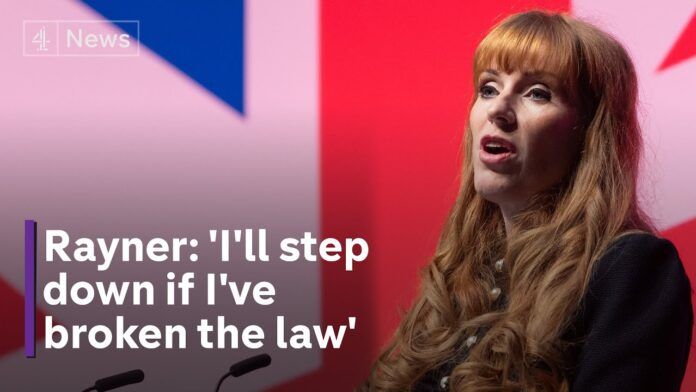Labour’s deputy leader Angela Rayner under scrutiny for potential electoral misconduct and tax issues
Labour’s deputy leader, Angela Rayner, is at the centre of a brewing controversy involving potential electoral law violations and tax issues related to her past council house sale. As multiple allegations surface, Greater Manchester Police have launched a formal investigation to ascertain the validity of claims surrounding Rayner’s primary residence during the early years of her marriage, prior to her tenure as an MP. This case not only raises questions about personal integrity and legal compliance among public officials but also underscores the political tensions between the Labour Party and its Conservative counterparts, who have been vocal in their criticism of Rayner. The investigation follows accusations that Rayner provided misleading information regarding her living situation, which could potentially involve tax liabilities from the profits of her house sale. As the police probe into these allegations, Rayner has expressed her willingness to resign if found guilty of any criminal offences, asserting her confidence in having adhered to all legal and regulatory expectations.
BBC
The BBC coverage of Angela Rayner’s controversy begins with her firm stance on resigning if legally implicated. Accused of falsifying her primary residence to benefit from a council house sale, Rayner faces scrutiny over her eligibility for a taxpayer-subsidized purchase made possible through the Right to Buy scheme. This scheme, introduced by Margaret Thatcher, allowed her to buy her council home at a discount, later selling it for a significant profit. The BBC report underscores Rayner’s insistence on her innocence, highlighting her preparedness to cooperate with police investigations and her criticism of what she perceives as politically motivated attacks by Conservative leaders. These allegations stem from inconsistencies in residence declarations, particularly around the re-registration of the births of her children and subsequent sale profits. With the backdrop of ongoing political rivalries, this situation resurrects debates about the accountability and transparency of politicians, especially in the wake of similar controversies faced by other Labour leaders.
The Independent
The Independent delves into the details of the police investigation into Angela Rayner, accentuating her anticipatory compliance with any legal outcomes. Echoing her statements of confidence in her adherence to rules, the report explores the broader political implications of this inquiry, suggesting a potential smearing campaign by the Tories. The timing and nature of the complaints against Rayner appear to reflect a recurring strategy of political parties utilizing legal challenges to discredit opponents during critical periods, a tactic previously observed in other high-profile cases within the UK political landscape. The Independent further discusses the public and political reaction, noting a blend of support and scepticism towards Rayner’s handling of the accusations, and how this may influence her future within the Labour Party.
The Guardian
The Guardian presents a comprehensive overview of the escalating legal challenges Angela Rayner faces, starting from the allegations made in an unauthorized biography and leading up to the police investigation. The coverage meticulously details the sequence of events that have led to the current scrutiny, including the strategic public disclosures and political manoeuvres. It emphasizes the potential consequences of the investigation on Rayner’s political career and the Labour Party’s image, especially in light of the approaching elections. The article highlights the intricate details of Rayner’s property transactions and her public defence against the allegations, portraying a scenario where personal history and political accountability intersect dramatically.
The Standard
The Standard focuses on the immediate implications of the police investigation for Angela Rayner and the Labour Party. It discusses the broader context of her resignation pledge, linking it to her broader political responsibilities and the ethical standards expected of public officials. The report elaborates on the procedural aspects of the investigation, including the criteria for electoral law breaches and the specific allegations regarding Rayner’s tax obligations stemming from her property sale. This coverage amplifies the legal and ethical questions surrounding the case, drawing attention to the intense media and public scrutiny that often accompanies such high-stakes political dramas.
The Mirror
Lastly, The Mirror offers a more critical and somewhat satirical angle on the ongoing controversy surrounding Angela Rayner. Through a detailed list of metaphorical ‘crimes’, it challenges the narrative constructed by her opponents and scrutinizes the motivations behind the political attacks she faces. This piece reflects on the broader societal and political dynamics at play, suggesting that the allegations against Rayner may be part of a deeper, more systemic issue of political rivalry and media portrayal of female politicians. The article provides a unique insight into the public discourse surrounding Rayner, contrasting it with the legal and factual aspects covered by other outlets.
